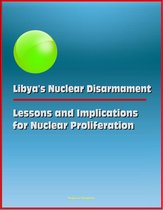To Join or Not to Join the Nuclear Club: How Nations Think about Nuclear Weapons: Two Middle East Case Studies - Libya and Pakistan Ebook Tooltip Ebooks kunnen worden gelezen op uw computer en op daarvoor geschikte e-readers.
Afbeeldingen
Sla de afbeeldingen overArtikel vergelijken
- Engels
- E-book
- 9781311162236
- 01 juni 2014
- Epub zonder kopieerbeveiliging (DRM)
Samenvatting
The current debate revolving around Iranian and North Korean nuclear programs highlights the need to foster a more complete understanding of the multidimensionality of states' decision-making process on whether to acquire and retain nuclear weapons. Case studies from the greater Middle East region offer the opportunity to examine the factors such states take into consideration when determining which path to follow. Such factors include threat perceptions, the interpretation of lessons learned from the experience of other countries, the calculus of perceived costs and benefits for national security, the envisioned modes of employment of nuclear weapons (political and military), and the legal/ethical considerations—all from the perspective of regional actors. Furthermore, a country's specific political decisionmaking process and its institutions are also key factors in understanding how actual and potential regional nuclear powers make decisions on the nuclear issue. As such, an understanding of the motivations and of the perceived utility of nuclear weapons from the perspective of recent and potential nuclear powers can help senior leaders craft more effective U.S. and multilateral nonproliferation, counterproliferation, and deterrence strategies. The two papers included in this Monograph offer insights into the differing paths taken by two countries in the greater Middle East region—Libya and Pakistan—with the former relinquishing its nuclear program and the latter acquiring a military nuclear capability.
The two papers in this monograph were presented at a conference entitled "To Join or Not to Join the Nuclear Club: How Nations Think about Nuclear Weapons." These two case studies are by Dr. Malfrid Braut-Hegghammer of the Norwegian Defence University College, "Relinquished Nuclear Powers: A Case Study of Libya," and by Dr. George Perkovich of the Nuclear Policy Program, Carnegie Endowment for International Peace, "Pakistan's Motivations for Possessing Nuclear Weapons and Challenges to the 'Unitary Rational Actor' Model for Managing Deterrence." These two papers were selected for their insights on differing paths taken by two countries in the greater Middle East region—Libya and Pakistan—with one having decided to relinquish its nuclear program and the other deciding to acquire a military nuclear capability.
Productspecificaties
Inhoud
- Taal
- en
- Bindwijze
- E-book
- Oorspronkelijke releasedatum
- 01 juni 2014
- Ebook Formaat
- Epub zonder kopieerbeveiliging (DRM)
Betrokkenen
- Hoofdauteur
- Progressive Management
- Hoofduitgeverij
- Smashwords Edition
Lees mogelijkheden
- Lees dit ebook op
- Android (smartphone en tablet) | Kobo e-reader | Desktop (Mac en Windows) | iOS (smartphone en tablet) | Windows (smartphone en tablet)
Overige kenmerken
- Studieboek
- Nee
EAN
- EAN
- 9781311162236
Je vindt dit artikel in
- Categorieën
- Boek, ebook of luisterboek?
- Ebook
- Taal
- Engels
- Beschikbaarheid
- Leverbaar
- Beschikbaar in Kobo Plus
- Beschikbaar in Kobo Plus
Kies gewenste uitvoering
Prijsinformatie en bestellen
De prijs van dit product is 3 euro en 66 cent.- E-book is direct beschikbaar na aankoop
- E-books lezen is voordelig
- Dag en nacht klantenservice
- Veilig betalen
Rapporteer dit artikel
Je wilt melding doen van illegale inhoud over dit artikel:
- Ik wil melding doen als klant
- Ik wil melding doen als autoriteit of trusted flagger
- Ik wil melding doen als partner
- Ik wil melding doen als merkhouder
Geen klant, autoriteit, trusted flagger, merkhouder of partner? Gebruik dan onderstaande link om melding te doen.








